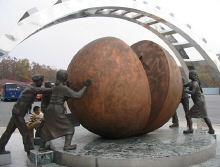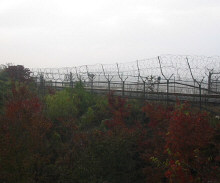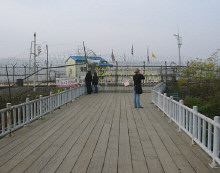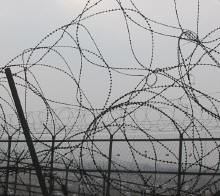
Imagine if I was to draw a line, somewhat arbitrarily, across a map of your country. From tomorrow there will be just North and South. All ties, emotional, financial and spiritual will cease to exist. What existed yesterday will be no more and, perhaps, will never exist again. Your horizon will be barbed-wire and concrete bunkers. Many of you will never see your loved ones again. This, is your future. Your daily bread will be propaganda, lies and intolerance. Brother will be pitted against brother, son against son whilst the tension escalates. How will you cope?
A grim opening from the latest Thomas Clancy shock-thriller? The far-fetched plot of the latest Hollywood blockbuster or the situation that millions of Korean’s find themselves in each day as the tension along the world’s last Demilitarised Zone, the DMZ, is cranked up to boiling point.
Of course, things are much worse than they first seem along the DMZ and you have to keep reminding yourself that this really could be the scene of the ‘big one’, the last great party in human civilisation or quite possibly The End of the World. These were the thoughts that made me shudder as I stood one pale autumn morning on the 38th parallel in Korea’s DMZ.
With the wall down in East Europe and relations thawing between western and communist powers everywhere from Vietnam to the former Soviet Union, the border between the two Koreas represents the final stand off left over from the Cold War. On either side of its 151-mile length, almost two million troops face each other ready to go to war at the drop of a hat. Things here have been on a hair trigger for almost 50 years, ever since the last shot was fired in the Korean War and an uneasy truce came into force. Officially, war has not yet ended – no formal peace deal has ever been signed and the fun could start again at any moment. If you believe what you read in the papers, and I always do, this could happen sooner rather than later.

The tension should be palatable but it isn’t. A lazy, tranquil feeling of almost serenity drifts over this tragic land. It may be one mistake away from Armageddon but there is a strange acceptance here, almost as if life on the last great dividing line left on the map will continue like this for ever. The click of tourist cameras and the murmuring of Japanese tour groups are all that disturb the serenity.
Along this last great dividing line are something like a million hardened, battle ready troops, mines, chemical and possibly biological weapons, and explosives to really light things up. And that’s just on the Southern side. Exactly what the North is up to is, in the words of the British Foreign Office, anyone’s guess. But you can be pretty sure they aren’t planning a weekend bar-b-que.
South Korea has obligatory military services. They take their young boys, barely out of school, and send them to serve on the Line. Now, call me old fashioned and a trifle cowardly, but the last people I want guarding the greatest threat to the free world (apart from my mum’s cooking) is a bunch of lonely, adolescent, heavily armed school boys who are paid the equivalent of U$10 a month for the honour of defending their homeland. The implications of a mistake are truly scary. Especially if you happen to live just 40km away in Seoul (OK, so the roads are mined and heavily fortified, but it’s still scary).
And, as I stand there, thinking: now isn’t this all a little silly and wondering if the respective leaders should get together over a couple of crates of beer and a good cigar and sort out this mess, I am pounded into submission as the guide reels out the most heart-breaking stories of pointless loss of human life; such as in 1976 when an American work detail attempted to trim a tree and in the ensuing skirmish, two US army officers were hacked to death and at least nine other soldiers wounded.

And I stand there and think: this is insane and utterly pointless. Why can’t we just all live together happily.
And just to crank the paranoia up further, beaches along the coast are surfaced to reveal footprints and patrolled nightly to prevent a North Korean invasion. Students are drilled on subversion and sedition. Bus signs warn South Koreans to look out for spies and strangers stop you on the subway and ask for help with their English homework: please explain nuclear full-out and aggressive-war-mongering-tactics.
And then I find myself outside a railway station waiting for a train which will never come (rather like home this is for me) but could perhaps, one day, run all the way to London.
‘Ladies and Gentlemen, due to weapons of mass destruction on the track, the 8.42 to North Korea will de delayed…for many years.’
And the guide, shame facedly, tries to tell me this isn’t all one big propaganda exercise whilst across the border people are eating grass and roots and thinking, with distended stomachs, how they could better spend the millions of dollars which have been pumped into this folly. I mooch around the wonderfully designed station kicking my heels feeling anger pump through my veins. The name of the station, my guide tells me, is Dorasan, which translates somehow or other as place you come back to after visiting a whore-house. I think the message is clear enough, don’t you?

And then after all the passport checks, the military swagger and barbed wire horizons, we are ushered down to the Third Infiltration Tunnel which runs directly below Panmunjom, the border village where armistice talks have been held since 1953. It was designed, if we can believe the propaganda, to allow 10,000 fully armed soldiers to pass per hour. Being there makes me feel Jonah-like and my palms feel damp with claustrophobia.
After I am severely reprimanded for taking a photograph (NO PICTURES – this is a state secret) I raise my eyebrows quizzically and ask the guide why the South Koreans didn’t spot the tunnel sooner (I mean, how can you not realise that your neighbour is blasting through solid granite under your feet…) My guide looks sheepish (as he should) and tells me that there is no more time left for questions. Later, he confesses, that the South Korean’s believe there could be up to 20 tunnels penetrating deep into Korea. I ask if they were too busy building railway stations to do seismic studies and receive another reproachful look.
Later, whilst standing outside the DMZ museum, and feeling queasy after another propaganda onslaught, the morning is split in two by a series of explosions. They sound worryingly close. My guide shrugs his shoulders, don’t worry it’s just a land mine, whilst a family of Japanese applaud. They think this is better than Disney Land Tokyo. I just feel sick.
As the bus trundles down the mined, wired and heavily guarded roads I cant help but shake my head and wonder how in the 21st century this kind of madness can continue. I look across the barbed-wire divide and try to imagine how it must feel to be separated from one’s family. I can’t. I feel, not for the first time today, terribly far from home.
![]()
And still the propaganda continues. Each side blasts opposing hillsides with patriotic music and recorded messages. A giant signboard on the North Korean side warns – in Korean script – “Yankee Go Home.” Most wish they could.
In one of the conference rooms, where the perennial armistice talks take place, the North Koreans once sawed a few inches off chair legs so that their counterparts at the negotiating table would look small and silly. When North Koreans attended a meeting on another occasion with AK-47 assault rifles obviously hidden under their jackets, American officers chose not to confront them. Instead the Americans took delight in jacking up the room’s heat to equatorial levels just so that they could see their adversaries, unwilling to expose their weapons, squirm and sweat in their heavy clothes.
I have watched the children at my son’s nursery behave better than this.
And as we finally leave the DMZ and head back to our hotels, all feeling a little less safe and secure, I can’t help but think that the world must be a terrible place to allow such places as the DMZ to exist. I hope never to return.
About the Author
Philip Blazdell has been traveling for the last fifteen years. His travels began when he followed a girl in nice purple pajamas to Istanbul and got into all kinds of trouble. He has never looked back. Philip’s pet hates are still Air Portugal and KLM, but thankfully he doesn’t have to use them as much as he used to. He still doesn’t enjoy getting up in the morning to go to Copenhagen though he is gradually coming to terms with this. When not traveling he can be found following his beloved Liverpool and is perhaps the only person in the country who actually believes they will win the league this year. On days when the Reds aren’t playing he can be found at home in a little Cambridgeshire village, cooking and drinking Tusker beer.
Questions?
If you want more information about this area you can email the author or check out our Asia Insiders page.
![]()